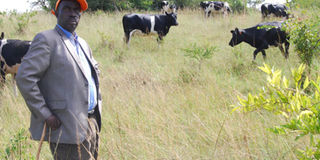Turning dairy farming into a flourishing enterprise

Jackson Katongore stands with some of his cows at his farm in Mbarara. He encourages dairy farmers to actively participate in farm activities to improve milk production PHOTO BY FELIX AINEBYOONA.
At the Daily Monitor Farm Clinic last Saturday, Jackson Bells Katongore shared how farming is a business which must benefit every individual who invests in knowledge, time and manpower.
“I am Jackson Bells Katongore, a farmer and chairman of dairy farmers of AbesiganaKashari cooperative society. Originally, I was a public servant but I retired two years ago to manage my farm,’’ he said.
Katongore has inspired many dairy farmers in Kashari under their Cooperative Society AbesiganaKashari Dairy Farmers Cooperative Society, where he is chairman. He says overdependence on workers has destroyed many businesses in the country. “Workers do not know why you are venturing in agriculture as some of them do not have a single animal at the individual level. So they may, knowingly or otherwise, sabotage your plans,” he shares.
Change
When he was still working with government, he used to collect between 50 litres of milk per day. However, after retiring in 2015, the milk production increased to 200 and 300 litres per day yet the number of cows has not increased. He attributes this to his physical presence at the farm.
‘’When I was still a public servant, I did not have time to go on my farm to manage so I was entirely depending on workers. Since 2015, when I took over the reins, the milk production has greatly improved and sometimes I get 300 litres a day up from 50 litres. What has brought about this is that I manage my farm myself. I have encouraged one of my children also to be on that farm so we are there two of us.’’
The switch
According to Katongore, there is a need to shift from traditional breeds of cattle to Friesian ones if dairy farmers want to try out commercial farming. The traditional Ankole long horned cattle produces insufficient milk compared to Friesian cows.
‘’Traditionally we have been raring Ankole long horn cattle but we need to cross to the Friesian breed. I am using artificial insemination and as such, most of our cows are now 80 per cent Friesian.
He adds, “when we had Ankole long horned cows, the milk was little until we went in for cross breeds, and yes there is a great improvement in the milk production.’’
After mastering the best way to carry out dairy farming as a business, Katongore joined a group of farmers, AbesiganaKashari Dairy Farmers Cooperative Society. He says when he joined the society in 2015, they collected between 5,000 litres and 8,000 litres of milk every day. However, the group boasts of between 10,000 and 13,000 litres per day since farmers have adopted Friesian cows.
Lessons
Katongore attributes the improved milk production to the regular capacity building trainings by SNV, UCC, DDA, and aBi Trust. “Those organisations have put a lot of effort to educate farmers and in turn, the farmers have implemented the recommendations made,” Katongore said.
He challenged farmers to borrow a leaf from Indians who do business in the country. Indians are always at their shops which has enabled them to prosper whereas Ugandans do not want to live by what they do that has failed their businesses.
“All that you have learnt, heard from the experts, agriculture officers, the administrators and politicians is we have make an effort to put most of those in practice. I want to testify to my colleagues that all that has been talked about today is possible,” he advised.
Nuggets of wisdom
“Farming can be a business but it requires discipline,” he explained. He believes farming should be done like business to get profits from it through keeping records of your farm, preparing feeds and water for the cows which will enable collecting of much more milk and improve the health of cows in the farm.
‘’I advise you that the only way is to manage it yourself as a business, keep records, prepare feeds and water and make sure your farm is productive. The time I came to my farm, I was selling my heifers at Shs1.5m and Shs2m, currently if you want a heifer from my farm you must pay not less than shs3m.
“There is no business that you can benefit from without investing heavily. Our problem is that when you invest you want returns immediately. You must be patient, he advised.
Expectations
His projections are to get between 400 and 500 litres of milk per day. He said the climate has changed and economically the economy has also changed calling for alternative ways of feeding cows.
Katongore says quality milk is priced higher especially during the dry season which can only happen if better farming methods are employed.
Rich source of food
So what is his secret, given many farmers complain they buy cows with promise, only to milk far less than they expect?
“The secret lies in maize,” he says.
“I mix the plants’ leaves with grass, which is good in fibre and feed the animals after I have given them maize stocks. This helps in milk production,” said Katongore.
A couple of local entrepreneurs are even buying milk in bulk and packaging it for resale, servicing areas a little further away. The local demand for good quality milk is so high that milk produced on the farm is sold immediately and does not even reach the bulk tank.
Did you know
Milk can be frozen for up to six weeks without any impact on its flavour and nutritional value; however, upon thawing, it can separate and lose its smooth texture. Partly skimmed and skim milk freeze better than whole milk (3.25%)




